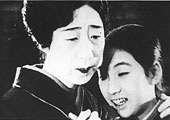One way to appreciate “Akeyuku Sora" (The Dawning Sky), a rare melodramatic silent film directed by Torajiro Saito, is to view the film against the socio-political turmoil of the time, notably the adventurous enterprises of the Japanese military inside Japan and overseas between 1927 and 1929. This period was marked by the inability of the civilian government, with the emperor as its titular head, to control rogue soldiers. Released in Japan on May 25, 1929, The Dawning Sky is a Shochiku Kinema Kamata Film Studio production with scenarios written by Ayame Mizushima and narrated by Midori Sawato.
The director Saito (1905-1982) is considered as Japan’s “god of comedy" and recognized as “one of the genius of the early Japanese films." He presents
The Dawning Sky as a tear-jerker about an orphaned girl and her mother who were separated before she could walk, losing contact for a long period and reunited before the 71-minute black-and-white film ends happily. The female screenwriter and the male director make use of the film’s suffering lead characters to represent the late 1920s Japanese society, making a restrained social commentary by highlighting the everyday ordeals of ordinary people stemming from the brewing political and economic crises. Saito was an extremely prolific director, with more than 200 titles of mostly slapstick comedies to his name from 1926 to 1962. One of his silent films, the
“Kodakara Sodo" (Kid Commotion), made incisive comments on the escalating population problem of Japan by depicting the daily difficulties of a destitute family whose life is marked by the annual arrival of an additional mouth to feed. The original title of this movie,
“Sanji Museigen" (Birth [Out of] Control), was changed to the non-socially disruptive “Kid Commotion" after public complaints that the previous one was too provocative. Writer Mizushima, on the other hand, is considered as the most productive female screenwriter of the Japanese silent movie era.
The Dawning Sky depicts events in what was then-poor Japan when its rulers actively coveted Manchuria as an area to build industries, a destination for Japanese immigrants, and a launching pad for its battles against the former Soviet Union. Perhaps as a device to escape from the censors and social pressures of the time,
The Dawning Sky carries strong Christian overtones. Viewers observe the emerging social mess through family adversities: a bank closure forcing the once rich owners to do manual work, social and personal relationships falling apart, sick people unable to seek medical attention due to poverty, and lack of public transport. The last one is worth noting here, with scenes where two men debate amusingly where exactly is the location of a bus stop. In rapid succession, the film opens with the marriage of Kyoko (played by lead actress Yoshiko Kawata) to the heir of a family that made vast fortunes in the banking industry. The heir dies and the family bank collapses due to economic difficulties, but a daughter is born out of the once-ideal union. The daughter, Reiko, is played by child actress Mitsuko Takao. Kyoko’s father-in-law, Junzo (Reikichi Kawamura), is enraged when her father begs that his young widowed daughter be allowed to leave the union so that she can marry again to ensure her future and that of her child. Eventually, Junzo relents on the condition that she leaves behind newly born daughter Reiko under his care. A distraught Kyoko wanders far and wide, stumbling upon a Christian church where, in due course, she becomes a priestess and takes care of the poor and children. Meanwhile, Junzo’s family loses all his family’s wealth and he is reduced to driving a horse carriage to support himself and Reiko. In time, he comes upon Kyoko and the tempo of the film quickens as he confesses to Reiko that the priestess is her mother. However, Kyoko decides to leave Junzo and Reiko in peace despite her longing to be reunited with her daughter. In going away and sacrificing again to save Reiko from additional grief and confusion, Kyoko’s character represents the hidden strength and power of Japanese women in bearing the unbearable for the sake of family and country. Here lies the heart and soul of this feminist film: a Japanese mother’s struggle to deal with the trauma of personal pain amid social disorder, economic dislocation, and political chaos. In its simple narrative,
The Dawning Sky also eloquently represents the emotional terrains of the people interacting in the late 1920s Japan: the tenderness and tragedies in their personal lives, as well as the beauty and violence of Japanese society at the time. Accompanying this excellent film at the
5th International Silent Film Festival Manila last August was a wonderfully lyrical live performance by
Bandang Malaya. Their music had an understated elegance that did not upstage the film, which is often the case in live accompaniment of silent films.
Bandang Malaya members describe themselves as “a group of musicians from the culture and arts sphere (creating) a space where they could compose music with their own language." The group members are Tapati (vocals), Ryan Arengo (guitar), Paul Viray (bass), Jaja Gomez (drums), Norman Labaguis (djembe, didgeridoo, darbuka, devil chimes flute, and back up vocals), TJ Dimacali (violin), Dong David (djembe), and Rama Candra Dasa (tabla and merdangga). –
YA, GMA News Photo courtesy of Japan Foundation - Manila Office 




